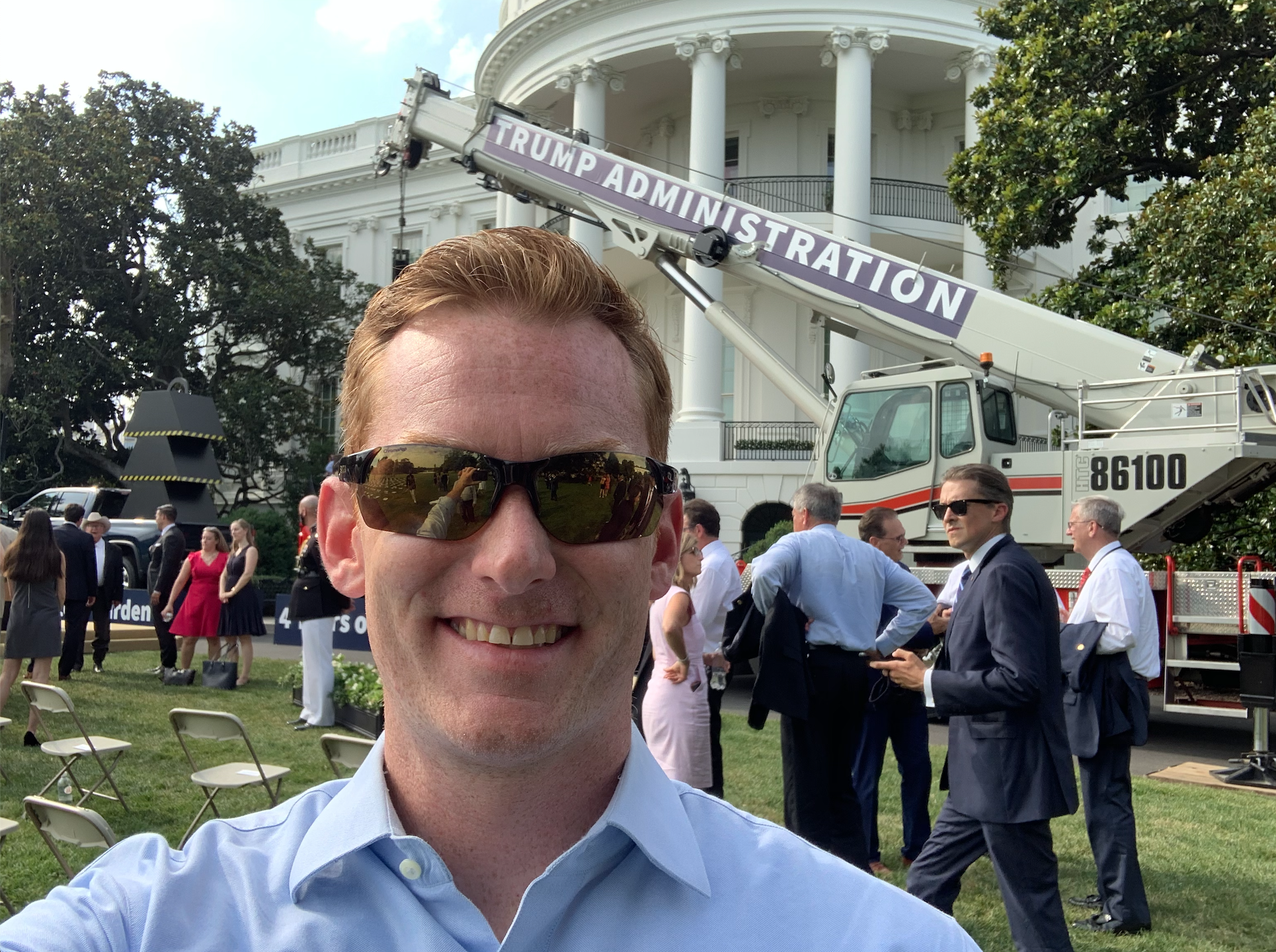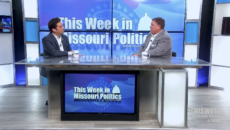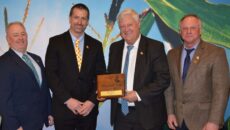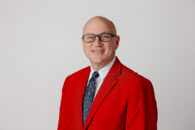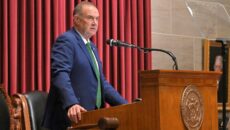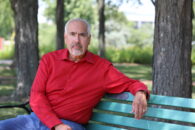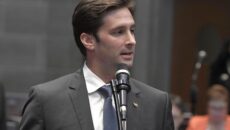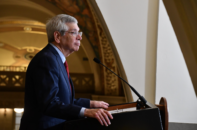As Rep. Derek Grier stood onboard the USS Theodore Roosevelt somewhere off the coast of Mexico, he was struck by the youth of those on deck, deftly handling tasks as jets took off and landed. Just a minor mistake could cost lives.
The average age of those on deck, Grier was told, was just 19.5 years old. It got him thinking: “Here we are launching these $100 million planes, and these folks are 19.5. This is high stress, this is high precision. … But in the state of Missouri, to be a master plumber, you have to be 25. We have all these arbitrary age restrictions on getting a professional license.”
That trip to the USS Theodore Roosevelt was in 2017. Since, Grier has authored major professional licensing reform legislation, appeared on podcasts and Zoom calls with other legislators across the country, and spoke on a White House call about its own licensing reform initiative.
It’s HB 2046, particularly the bipartisan nature of it, that thrust Grier into the national spotlight. Signed into law by Gov. Mike Parson earlier this year, the bill expanded license reciprocity and established a ban on occupational licensing boards denying licenses based on criminal history, with the exception of violent or sexual crimes or crimes directly related to the licensed profession. It’s a sweeping measure, which one White House appointee referred to as “one of the best policies in the nation.”
Grier also championed earlier legislation which eliminated certain age restrictions in professions.
“For the government to come in and make it harder than it already is — especially when it has nothing to do with health, safety, or wellness — it was challenging for me as an elected official to say well, I’m not going to do anything about it,” Grier said.
“We are now the leaders in occupational licensing reform, and other states are looking to us, and the White House recognized the work we did.”
Grier, a Republican who was recently re-elected to his House seat, was invited to the White House over the summer for an event celebrating “rolling back regulations.” And in October, Grier was one of only a handful of people who spoke on a White House call about the Trump administration’s Governors’ Initiative on Regulatory Innovation. The initiative is a collaborative effort among the White House and state, local, and tribal leaders on deregulatory work, a White House official told The Missouri Times.
“The bill that he helped lead echoed a lot of things that the president has been working on at the federal level and saw him working in a bipartisan way at the state level,” the official said.
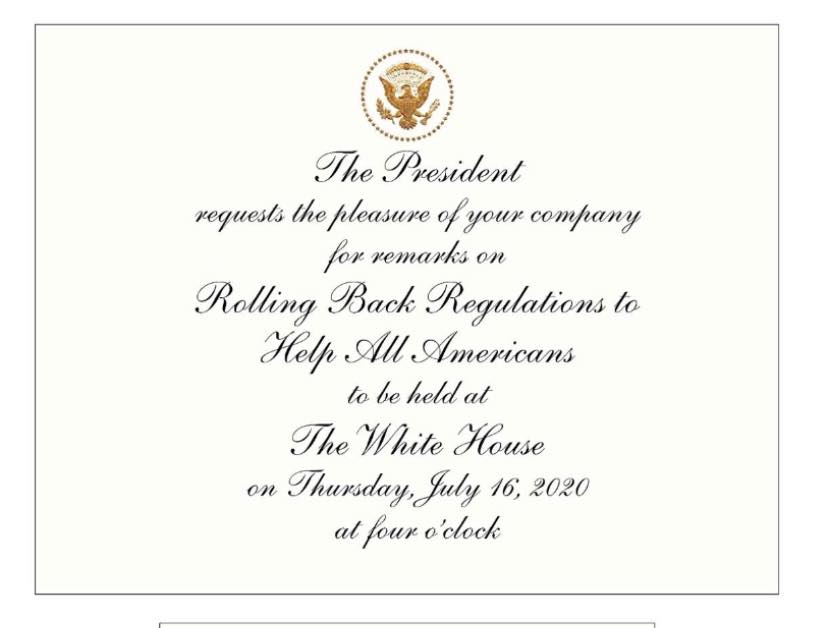
Grier has also met with — albeit, sometimes virtually during the pandemic — leaders in other states who are considering similar efforts. And in the General Assembly, he chairs the Economic Development Committee and sits on the Professional Registration and Licensing Committee.
“Rep. Grier embodies public service with expertise. He finds problems in his community that he has the power to solve, and then he gets to work,” Shoshana Weissmann, a fellow at the R Street Institute in Washington, D.C., said. “His passion for occupational licensing reform, reasonable criminal justice reform, and other similar issues come through in his legislation. It’s exciting to have the opportunity to work with people like him, people who get into the weeds to improve life for his constituents.”
“We greatly appreciate the committed effort and leadership of Rep. Derek Grier in addressing the important issue of expanding license reciprocity provision in Missouri,” Parson said. “By expanding license reciprocity, HB 2046 will eliminate governmental barriers to employment and allow citizens to become licensed faster when moving or needing to find work in MIssouri. This will not only help fill critical jobs in our economy but also highlight Missouri as an ideal state to live and work.”
Despite the sweeping license reciprocity bill that passed earlier this year — receiving a unanimous vote in the Senate — Grier isn’t done. Now, he plans to go through each occupational license, one by one, and take a closer look.
“If we’re accepting somebody from another state that has a lesser requirement, is it fair to Missourians getting their license to have to go through more training and requirements than what we’re accepting from other states? So I think we have to look at what is the right standard here to have, and maybe we should adjust some of ours here in Missouri to be more accommodating to folks because it doesn’t make sense to have such a big disparity,” Grier said.

Kaitlyn Schallhorn was the editor in chief of The Missouri Times from 2020-2022. She joined the newspaper in early 2019 after working as a reporter for Fox News in New York City.
Throughout her career, Kaitlyn has covered political campaigns across the U.S., including the 2016 presidential election, and humanitarian aid efforts in Africa and the Middle East.
She is a native of Missouri who studied journalism at Winthrop University in South Carolina. She is also an alumna of the National Journalism Center in Washington, D.C.
Contact Kaitlyn at kaitlyn@themissouritimes.com.

